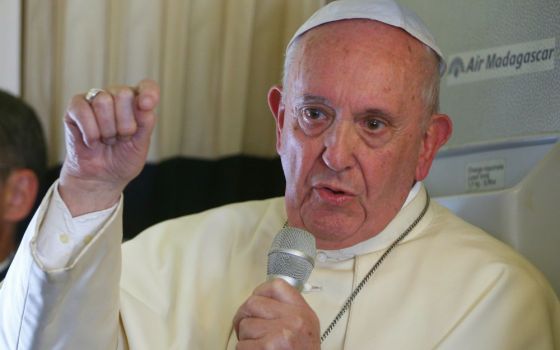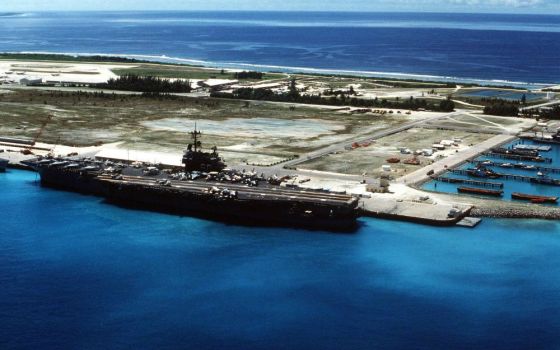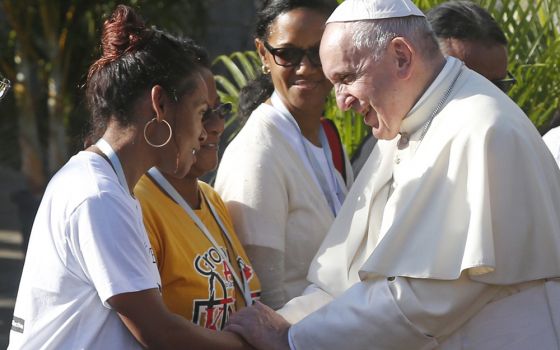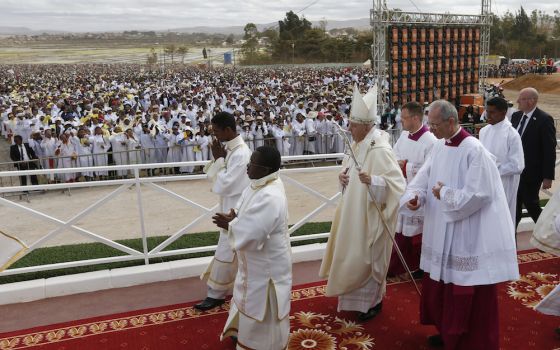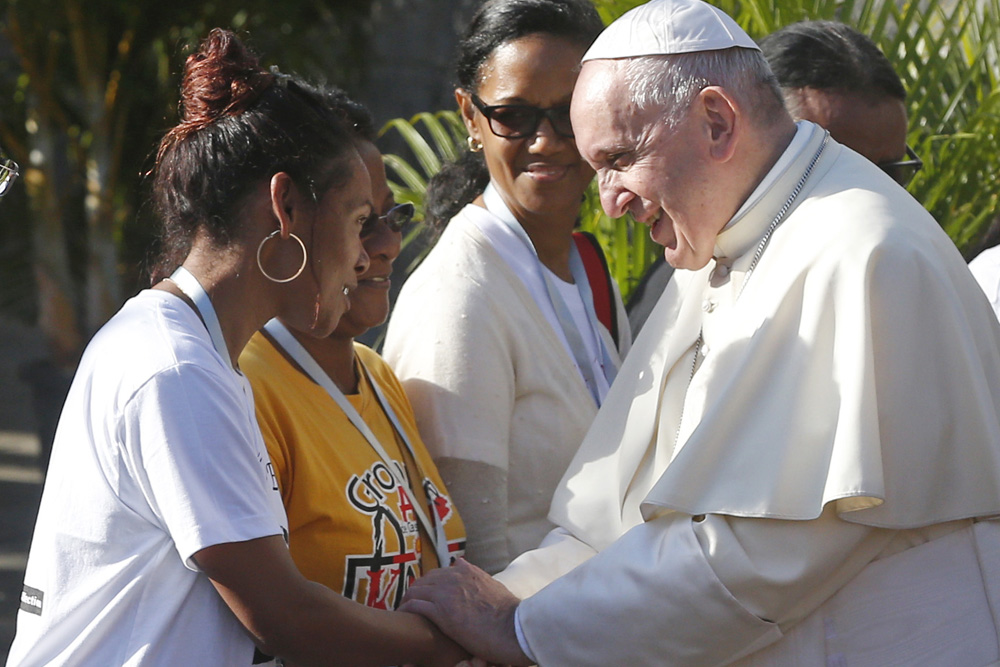
Pope Francis greets a young woman as he visits the Shrine of Blessed Jacques-Desire Laval, the "apostle of Mauritius," Sept. 9 in Port Louis, Mauritius. (CNS/Paul Haring)
Pope Francis Sept. 9 exhorted the political leaders of the island nation of Mauritius, known internationally as a tax haven and enclave for shell companies, to promote policies that reduce income inequality and to reject "the temptation of an idolatrous economic model."
In an eight-hour visit to the country, located in the Indian Ocean about 700 miles east of Madagascar, the pontiff pointed to economic growth that he said "does not always profit everyone" and "feels the need to sacrifice human lives on the altar of speculation and profit alone."
Addressing interim President Barlen Vyapoory and the country's other political leaders directly during an event at the presidential palace, the pope said: "I would like to encourage you to promote an economic policy focused on people and in a position to favor a better division of income, the creation of jobs and the integral promotion of the poor."
Francis is visiting Mauritius, a former French and then British colony that gained its independence in 1968, as part of a three-nation tour of Southern Africa. His remarks during the visit have been the most forceful yet of his Sept. 4-10 voyage, and some of the most direct he has ever offered to political leaders during his 31 trips abroad as pontiff.
The pope's visit comes as the country is dealing with a series of public embarrassments, including the resignation of Vyapoory's predecessor over a credit card expense scandal and release of a series of reports, known together as the "Mauritius Leaks," showing how international companies take advantage of the country's super-low corporate tax rates to hide billions from their native governments.
Although Francis did not refer to any particular scandal by name, at several points in his address he said he wanted to "encourage" the country's leaders to pursue certain policies, in an unusual shift from the pope's more cautious and diplomatic style on his trips abroad.
"By your conduct and your determination to combat all forms of corruption … you demonstrate the grandeur of your commitment in service to the common good and [are] worthy of the trust placed in you by your fellow citizens," the pontiff said.
The Mauritian government has called the information contained in the "Mauritius Leaks," released by the International Consortium of Investigative Journalists, "outdated." They say they have made policy changes in recent years to tighten controls on corporations that want to benefit from their tax rates.
In his address welcoming Francis to the country, Prime Minister Pravind Kumar Jugnauth acknowledged that economic inequality was "too great" in Mauritius, but said his government knows that "sustaining and comforting those who are most weak is a moral duty."
Eric LeCompte, the leader of Jubilee USA, a network of religious and development groups that argue for international debt relief, cited figures showing that sixty percent of the people of Mauritius see corruption as on the rise in their country. He called the island nation "the premier tax haven in the region draining revenue from many poor countries in Africa."
Mauritius, which has a total population of about 1.3 million, is about one-third Catholic. In his first event on the island, Francis celebrated Mass with about 100,000 people, who were gathered outdoors on a hillside under a monument dedicated to Mary.
Under gray skies and intermittent rain, the pope focused in his homily on the witness of one of the country's best-known Catholics, Blessed Jacques-Désiré Laval, a 19th century French Spiritan priest and missionary who devoted his life to caring for slaves in the then-British colony.
"Love for Christ and for the poor so marked his life that he could not conceive of an aloof and sanitized preaching of the Gospel," the pontiff said of Laval. "His pastoral solicitude earned the trust of the poor and outcast, and made them the first to come together and find responses to their sufferings."
Francis also mentioned economic issues in his homily, referring to Mauritius' problem with youth unemployment, saying it leaves young people "vulnerable and helpless before new forms of slavery."
Mauritian government figures from 2018 estimate that although the country's total unemployment rate sits at 6.9 percent, about 25 percent of young people between 16 and 24 are unemployed.
Advertisement
Before addressing the political leaders, the pope made a brief visit to a shrine dedicated to Laval, where he left flowers on the priest's tomb.
Local Catholics found significance in the pontiff making the visit on the 155th anniversary of Laval's Sept. 9, 1864, death, which is commemorated each year with a walking pilgrimage across the island, which is about the size of the state of Rhode Island.
Fr. Jean Claude Veder, the director of a diocesan training institute in Mauritius, called the timing "a great gift of God."
Francis is returning for the evening Sept. 9 to Madagascar, before heading home to Rome in the morning of Sept. 10.
[Joshua J. McElwee is NCR Vatican correspondent. His email address is jmcelwee@ncronline.org. Follow him on Twitter: @joshjmac.]





